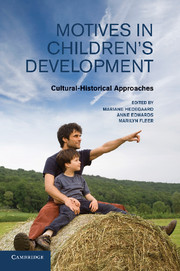Book contents
- Frontmatter
- Contents
- Figures
- Introduction
- Part One Motives, Emotions and Development
- 1 The Dynamic Aspects in Children’s Learning and Development
- 2 The Connection between Motive and Will in the Development of Personality
- 3 Advancing on the Concept of Sense
- 4 Early Stages in Children’s Cultural Development
- Part Two Cultural Practice Motives and Development
- Part Three Creating Conditions for Children’s Engagement
- Index
- References
3 - Advancing on the Concept of Sense
Subjective Sense and Subjective Configurations in Human Development
from Part One - Motives, Emotions and Development
Published online by Cambridge University Press: 05 November 2011
- Frontmatter
- Contents
- Figures
- Introduction
- Part One Motives, Emotions and Development
- 1 The Dynamic Aspects in Children’s Learning and Development
- 2 The Connection between Motive and Will in the Development of Personality
- 3 Advancing on the Concept of Sense
- 4 Early Stages in Children’s Cultural Development
- Part Two Cultural Practice Motives and Development
- Part Three Creating Conditions for Children’s Engagement
- Index
- References
Summary
Introduction
The interpretations of Vygotsky’s work in both Russian and Western psychology have predominantly focused on his work between 1928 and 1931 (González Rey, 2001, 2008a, 2008b; Leontiev, 1992, 2001), known as cultural-historical theory. In this dominant approach, his contributions concerning emotions and fantasy and his attempt to understand the mind as a complex system have been overlooked. The attempts to identify Vygotsky with American pragmatists have avoided those of Vygotsky’s ideas which do not correspond to the interpreters’ theoretical positions. This fact does not imply any deliberate intention; interpretations always represent new constructions based on the interpreters’ views. But of course, some interpretations are always better supported and more convincing than others.
Until very recent times, those of Vygotsky’s ideas that have been highlighted by most of his Western and Russian interpreters have been taken as an expression of Vygotsky’s mature work. In Western psychology, this one-sided interpretation of Vygotsky’s work has found its most extensive application in the Cultural Historical Activity Theory (CHAT), that has been put forth as a theoretical fusion between Vygotsky and Leontiev, omitting the great differences between them.
- Type
- Chapter
- Information
- Motives in Children's DevelopmentCultural-Historical Approaches, pp. 45 - 62Publisher: Cambridge University PressPrint publication year: 2011
References
- 1
- Cited by



